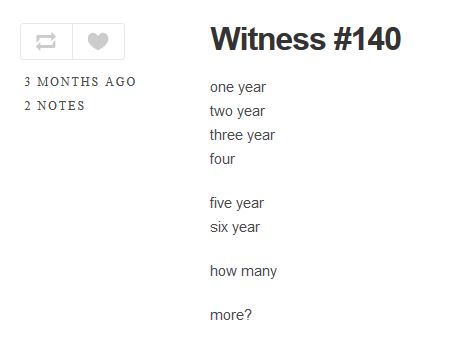We know that it isn't "poetry" because it's a children's rhyme, some variation on "tinker, tailor" or a counting rhyme; if there's a more specific reference to a nursery rhyme buried in there, it doesn't spring to my mind. But the point is still clear: "poetry" is felt by its absence. This is a nursery rhyme, “poetry” in only the most rudimentary and definitional sense, a kind of of poetic zero-point. Whatever poetry is, in its traditional definitions, "doggerel" is non-poetic poetry.
It is not, however, simply a negation; it is a negation with content. What we are also not reading is: a work of moral cultivation, the kind of literary text whose Nussbaum-ian ambition is to foster greater understanding and civic appreciation for others by cultivating new sensibilities and sympathies. If childrens' rhymes have a function, after all, it might be to teach you to count, but more often they're used to lubricate particular social situations, allowing a choice to be made without needing to make a choice (eenie-meenie-minie-moe, duck, duck goose, etc), for example, or as a kind of crude divination.
As doggerel childrens' rhyme, such poetry is not part of the liberal tradition which argues for the necessity and importance of literature (perhaps, Literature) by reference to its pedagogical function, the ability of the literary to transform us into better and more sympathetic people. Richard Rorty's argument, for example, that "the moral educator's task" is to explain why a person should care about strangers, people who are not kin and whose habits we find disgusting, finds its ideal text in "the sort of long, sad, sentimental story which begins 'Because this is what it is like to be in her situation -- to be far from home, among strangers,' or 'Because she might become your daughter-in-law,' or 'Because her mother would grieve for her.'":
Such stories, repeated and varied over the centuries, have induced us, the rich, safe, powerful, people, to tolerate, and even to cherish, powerless people -- people whose appearance or habits or beliefs at first seemed an insult to our own moral identity, our sense of the limits of permissible human variation.
Basically, Rorty describes Uncle Tom's Cabin, a story that, among other things, helped reconcile racism with the abolition of slavery: just because black people were alien children, it taught us (the rich, safe, powerful, people), their inferiority was no reason not to tolerate and even to cherish them.
What you have to notice about those kinds of arguments for the utility of literature, of course, is that they inherit from John Locke a sympathetic ambition to overcome and transcend various forms of difference which they nevertheless reiterate and reinforce: if these stories have induced "us, the rich, safe, powerful, people" to cherish and tolerate the powerless people, it is precisely so that the antagonisms of hierarchy or stranger-danger no longer seem to emanate from class difference, or from the relations of oppression that accompany and enable the difference between powerful us and powerless them. To put it as sharply as possible, poetry as pedagogy is about producing a society safe for inequality, teaching the betters to "cherish" their inferiors, the better to enjoy their superiority. The result is that, as a marker of cultural difference, an appreciation for the finer things transforms difference into educational hierarchy: cultural repertoires that do not suit one for a professorship at Stanford or Chicago, for example, become retroactive justification for the fact that one has not climbed that ladder of success.
Witness #140 isn't just not the thing it isn't, however; it's also a thing in its own right. As a counting rhyme--with shades of incantatory divination--it marks the time which has passed, in years, since 2007, when PEV became an acronym for "Post Election Violence."But you canot count time in this way. After all, these kinds of counting and divination games work by creating a temporal sequence out of a spatial arrangement, turning a circle of heads into a line of ducks and geese, or selecting from two simultaneous (but spatially distinct) choices by drawing a line that bobs back and forth: Eenie, meenie, minie, moe. You cannot count the passage of time in this way, unless the poem becomes a Borgesian map of the country which it charts, in which you dutifully reciting a line each year. The poem must stop time, therefore, in order to count it, narrating the passage of subjective time from a poetic still point, changing the earth's objective passage around the sun into an endless maddening procession of the same. Each year is the same, just one more; "how many?" asks the poet, knowing it doesn't matter: the years will keep coming, but nothing will change. And yet.
